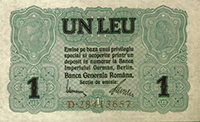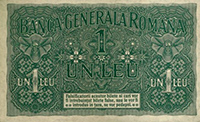Romania entering World War One on the side of the Allied Powers in August 1916 marked the beginning of a very trying period for the National Bank of Romania, as the bank’s wealth, prestige and staff all hung in the balance.
The first misfortune was the seizure of the NBR’s deposits of gold, Deutschmarks and Austro Hungarian crowns held with the Reichsbank and other banks in Germany and Austria-Hungary. This was followed by the defeat suffered by the Romanian Army at Turtucaia, which forced the NBR board to evacuate its treasure, the guarantee for the banknotes in circulation, to Iași. Faced with such hard times, the NBR board would later decide to send the treasure to Moscow on 14/27 December 1916.
Shortly thereafter, the battles lost forced the Romanian authorities to decide to retreat to Iași. The National Bank of Romania stayed faithful to its mission and followed the government and the royal house into exile to Moldavia’s capital city. Remaining in Bucharest was a delegation with limited tasks comprising two Board members (Constantin I. Băicoianu and Nicolae I. Bărbulescu) and two censors (Dr. Constantin Cantacuzino and Constantin Krupensky).
For the delegation staying behind in occupied Romania, the challenges to the Bank’s prestige and wealth intertwined with those bringing into question the people’s safety.
In order to ensure its dominance, from the very first days of the occupation, the German authorities proceeded to devaluing the leu and then creating war money and putting it into circulation at the beginning of 1917, through the issuance section attached to the General Romanian Bank. In sign of protest, the bank’s Chairman of the Board, Theodor Rosetti, a former NBR Governor, stepped down from his position.


Leu 1 banknote – The General Romanian Bank
(NBR Archives photo collection)
However, this was only the beginning. Delegate director C.I. Băicoianu was put under arrest and, later on, sent in detention to Bulgaria. Ultimately, the German authorities seized the NBR head office in Bucharest on 18 February/3 March 1917.

The NBR during German occupation – postcard
Despite all the trials faced from 1916 to 1918, in the words of Constantin I. Băicoianu, the National Bank of Romania, “aware of its mission to steer the national life of Romania, […] did not bow down to the enemy, but weathered the storm with courage and faith, confident in the justice of its cause arising out of the Articles of Agreement, awaiting with weary resignation the day of judgment, which was not late in coming”.